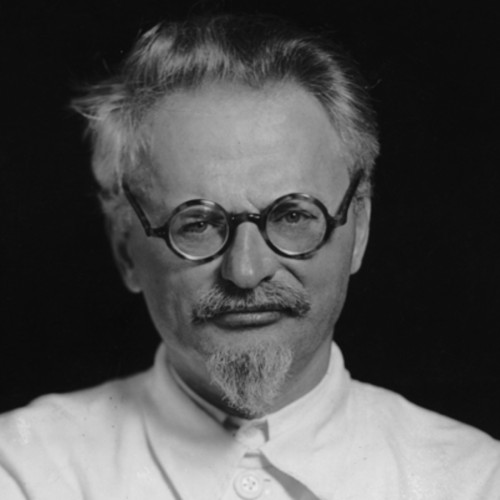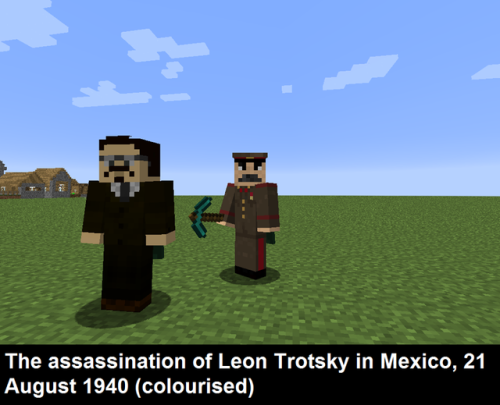#trotsky
Trotsky is helpfully demonstrating scale on this giant painting for me
#caturday #trotsky #inceptionkitties #originalart
https://www.instagram.com/p/Cb29zWip-Eu/?utm_medium=tumblr
Post link
http://content.time.com/time/subscriber/article/0,33009,770539,00.html
While Trotskyism and permanent revolution are flawed ideologies that should be opposed by any rational Marxists, our comrade has a great analysis on the bread and circuses employed in a capitalist society to tranquilize the workers and masses in an industrialized society. This is in no way shape or form an advocacy of Trotskyism.
“Capital does not like the working man to think and is afraid….It has therefore adopted measures. … It has put up automats in each station and has filled them with disgusting candied gum. With an automatic movement of the hand the people extract from these automats pieces of sweetish gum, and they grind it with the automatic chewing of their jaws… . It looks like a religious rite, like some silent prayer to God-Capital.“
Haha leftist communist KFC man says bubble gum machine bad. Except, this same phenomenom can be seen within parasocial relationships practiced between the proletariat and figures such as instagram influencers, twitch streamers, youtubers, and aspects of pop culture. It is remarkable how coping mechanisms such as gaming and participation of social media can be seen as a modern kafkaesque religious ritual.
Post link

The deck of the Petropavlovskafter the defeat of the rebellion.
March 17 1921, Kronstadt [Kotlin]–The failure of the initial attack on Kronstadt was an embarrassment for the Communists, who on the same day convened their Tenth Party Congress in Moscow. On March 10, after Trotsky reported on the situation, 320 delegates volunteered to join the fight. With the spring fast approaching and the ice in the Gulf of Finland threatening to melt, Tukachevsky had to act quickly.
While he prepared another offensive, events moved even quicker at the Congress in Moscow. Lenin had found himself facing direct threats from Kronstadt, strikes in the major cities, and widespread peasant rebellions, along with internal opposition in the form of the Alexander Shliapnikov and Alexandra Kollontai’s Workers’ Opposition. The strikes had largely petered out by mid-March, with promises that trade would resume with the countryside and the food situation would improve. Kronstadt would be crushed by force. The Workers’ Opposition would be effectively dissolved by a ban on internal Communist Party factions, passed without fanfare on April 16 but which would confirm a dictatorship until Gorbachev.
The farmers, Lenin chose to mollify. Food had heretofore been requisitioned from communities in large quantities by the government. This system was to be turned into a tax, 45% lower than the previous rate, and levied on an individual basis. Any remaining food could be sold on the open market, and additional incentives were provided to boost production. What would become the New Economic Policy pleased the farmers who directly benefited, and the city-dwellers whose food worries would be alleviated; it had only taken a betrayal of Communist ideals. Lenin justified this before the Congress on March 15 by saying that an alliance with the peasants was needed if Communism was to survive in a relatively non-industrialized country like Russia without outside help–but after years of war, there was little opposition to a policy that might bring an end to the conflicts.
The announcement of the land tax also boosted the morale of Tukachevsky’s forces, which had also been reinforced with loyal Communists from around the country. He began another bombardment of Kronstadt on the afternoon of the 16th, and his infantry attacked across the ice in the wee hours of the 17th. Casualties were high; over 10,000 (including 15 of the party delegates who had volunteered from Moscow) were felled by the defenders or were lost through holes in the ice. But shortly before midnight, the Communists had captured the Petropavlovskand most of the other rebellious ships. About 8000 of the rebels escaped across the ice to Finland; most of those captured by the Communists were shot or died in a concentration camp on the White Sea.
Sources include: Orlando Figes, A People’s Tragedy; W. Bruce Lincoln, Red Victory.
Readings on the Marxist doctrine of the State:
The Civil War in France by Karl Marx (1871)
The Critique of the Gotha Programme by Karl Marx (1875)
On Authority by Frederick Engels (1872)
Origin of the Family, Private Property and the State by Frederick engels (1884)
The State and Revolution by Valdimir Lenin (1918)
The State by Vladimir Lenin (1919)
The Proletarian Revolution and the Renegade Kautsky by Vladimir Lenin (1918)
“Democracy” and Dictatorship by Vladimir Lenin (1919)
Communist International Theses on Bourgeois Democracy and the Dictatorship of the Proletariat(1919)
Terrorism and Communism by Leon Trotsky (1920)
Ideology and Ideological State Apparatuses by Louis Althusser (1970)
“Those who recognize only the class struggle are not yet Marxists; they may be found to be still within the bounds of bourgeois thinking and bourgeois politics. To confine Marxism to the theory of the class struggle means curtailing Marxism, distorting it, reducing it to something acceptable to the bourgeoisie. Only he is a Marxist who extends the recognition of the class struggle to the recognition of the dictatorship of the proletariat.”
Vladimir Lenin, The State and Revolution, 1918
Post link
The main peculiarity, however, lies in the fact that this advance has not been effected through a steady upward movement but through zigzags. First we had the régime of “Communism”, followed by our opening the gates for market relations. The bourgeois press has declared this turn in policy to be a renunciation of Communism, marking the beginnings of a capitulation of capitalism. Needless to say, the Social Democrats are expounding this theme, elaborating it and adding commentaries to it. It is inadmissible, however, not to recognize that here and there even a few of our friends have fallen into doubt: Isn’t there actually a masked capitulation to capitalism here? Isn’t there really a danger that capitalism might, by basing itself on the free market we restored, begin to develop more and more, and gain the upper hand over the beginnings of socialism? To answer this question it is first necessary to clear away the basic misunderstanding. The contention that Soviet economic development is travelling from Communism to capitalism is false to the core. We never had Communism. We never had socialism, nor could we have had it. We nationalized the disorganized bourgeois economy, and during the most critical period of life-and-death struggle we established a régime of “Communism” in the distribution of articles of consumption. By vanquishing the bourgeoisie in the field of politics and war, we gained the possibility of coming to grips with economic life and we found ourselves constrained to reintroduce the market forms of relations between the city and the village, between the different branches of industry, and between the individual enterprises themselves.
Failing a free market, the peasant would be unable to find his place in economic life, losing the incentive to improve and expand his crops. Only a mighty upsurge of state industry, enabling it to provide the peasant and agriculture with all its requirements, will prepare the soil for integrating the peasant into the general system of socialist economy. Technically this task will be solved with the aid of electrification, which will deal a mortal blow to the backwardness of rural life, the muzhik’s barbaric isolation, and the idiocy of village life. But the road to all this is through improving the economic life of our peasant-proprietor as he is today. The workers’ state can achieve this only through the market, which stimulates the personal and selfish interests of the petty proprietor. The initial gains are already at hand. This year the village will supply the workers’ state with more bread-grains as taxes in kind than were received by the state in the period of War Communism through confiscation of the grain surpluses. At the same time, agriculture is undoubtedly on its way up. The peasant is satisfied – and in the absence of normal relations between the proletariat and the peasantry, socialist development is impossible in our country.
[..]
But the New Economic Policy does not flow solely from the interrelations between the city and the village. This policy is a necessary stage in the growth of state-owned industry. Between capitalism, under which the means of production are owned by private individuals and all economic relations are regulated by the market – I say, between capitalism and complete socialism, with its socially planned economy, there are a number of transitional stages; and the NEP is essentially one of these stages
[..]
The foregoing considerations apply even more obviously to industrial enterprises which were not any way nearly so centralized and so normalized under capitalism as the railway lines. With the liquidation of the market and of the credit system each factory resembled a telephone whose wires had been cut. War Communism created a bureaucratic surrogate of economic unity. The machine-building factories in the Urals, in the Donets Basin, Moscow, Petrograd and elsewhere were consolidated under a single Central Commissariat, which centralistically allotted them fuel, raw materials, technical equipment and working forces, maintaining the latter through a system of equal rations. It is perfectly self-evident that such a bureaucratic management completely levelled off the peculiarities of each individual enterprise and cancelled out any possibility of verifying its productive capacity and its gainfulness, even if the bookkeeping entries of the Central Commission had been distinguished by a greater or lesser degree of precision, which in reality has been out of the question.
Before each enterprise can function planfully as a component cell of the socialist organism, we shall have to engage in large-scale transitional activities of operating the economy through the market over a period of many years. And in the course of this transitional epoch each enterprise and each set of enterprises must to a greater or lesser degree orient itself independently in the market and test itself through the market. This is precisely the gist of the New Economic Policy: while politically it has meant that concessions to the peasantry have taken the limelight, it is of no lesser importance as an unavoidable stage in the development of state-owned industry during the transition from capitalist to socialist economy.
[..]
The financial difficulties of our industry are not, therefore, self-limited in character but derive from the entire process of our economic revival. If our Financial Commissariat were to accede to the demands of each industrial enterprise by increasing its currency emissions, the market would regurgitate the superfluous paper money, before the impatient factories succeeded in throwing new products into the, markets. In other words, the value of the ruble would drop so catastrophically that the purchasing power of this doubled or tripled emission would be less than the purchasing power of the money now in circulation. Our state of course does not renounce new currency emissions, but these must come in consonance with the actual economic process and must in each case be so calculated as to increase the state’s purchasing power and thereby aid in the primitive socialist accumulation. Our state, for its part, does not renounce planned economy in toto, that is, of introducing deliberate and imperative corrections into the operations of the market. But in so doing our state does not take as its point of departure some a priori calculation, or an abstract and extremely inexact plan-hypothesis, as was the case under War Communism. Its point of departure is the actual operation of this very same market; and one of the instruments of regulating the market is the condition of the country’s currency and of its centralized governmental credit system.







